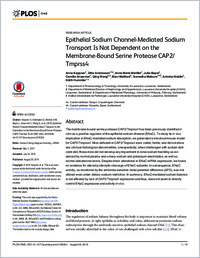Epithelial sodium channel-mediated sodium transport is not dependent on the membrane-bound serine protease CAP2/Tmprss4
- Keppner, Anna Department of Pharmacology & Toxicology, University of Lausanne, Switzerland
- Andreasen, Ditte Department of Pharmacology & Toxicology, University of Lausanne, Switzerland
- Mérillat, Anne-Marie Department of Pharmacology & Toxicology, University of Lausanne, Switzerland
- Bapst, Julie Department of Pharmacology & Toxicology, University of Lausanne, Switzerland
- Ansermet, Camille Department of Pharmacology & Toxicology, University of Lausanne, Switzerland
- Wang, Qing Department of Medicine/Physiology, University of Fribourg, Switzerland - Department of Medicine/Division of Nephrology and Hypertension, Lausanne University Hospital (CHUV), Lausanne, Switzerland
- Maillard, Marc Department of Medicine/Division of Nephrology and Hypertension, Lausanne University Hospital (CHUV), Lausanne, Switzerland
- Malsure, Sumedha Department of Pharmacology & Toxicology, University of Lausanne, Switzerland
- Nobile, Antoine Institut Universitaire de Pathologie, Lausanne University Hospital (CHUV), Lausanne, Switzerland
- Hummler, Edith Department of Pharmacology & Toxicology, University of Lausanne, Switzerland
-
26.08.2015
Published in:
- PLoS ONE. - 2015, vol. 10, no. 8, p. e0135224
English
The membrane-bound serine protease CAP2/Tmprss4 has been previously identified in vitro as a positive regulator of the epithelial sodium channel (ENaC). To study its in vivo implication in ENaC-mediated sodium absorption, we generated a knockout mouse model for CAP2/Tmprss4. Mice deficient in CAP2/Tmprss4 were viable, fertile, and did not show any obvious histological abnormalities. Unexpectedly, when challenged with sodium-deficient diet, these mice did not develop any impairment in renal sodium handling as evidenced by normal plasma and urinary sodium and potassium electrolytes, as well as normal aldosterone levels. Despite minor alterations in ENaC mRNA expression, we found no evidence for altered proteolytic cleavage of ENaC subunits. In consequence, ENaC activity, as monitored by the amiloride-sensitive rectal potential difference (ΔPD), was not altered even under dietary sodium restriction. In summary, ENaC-mediated sodium balance is not affected by lack of CAP2/Tmprss4 expression and thus, does not seem to directly control ENaC expression and activity in vivo.
- Faculty
- Faculté des sciences et de médecine
- Department
- Département de Médecine
- Language
-
- English
- Classification
- Biological sciences
- License
- License undefined
- Identifiers
-
- RERO DOC 257292
- DOI 10.1371/journal.pone.0135224
- Persistent URL
- https://folia.unifr.ch/unifr/documents/304578
Statistics
Document views: 71
File downloads:
- wan_esc.pdf: 139
